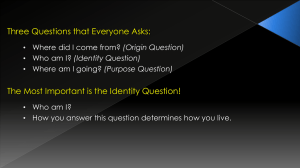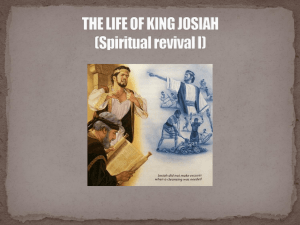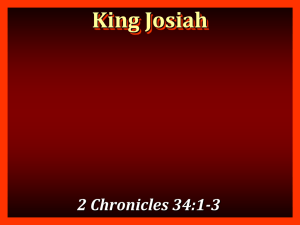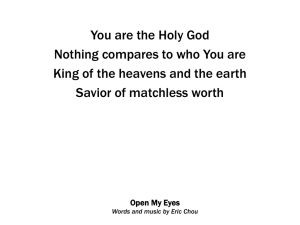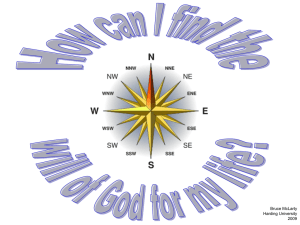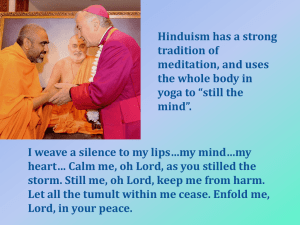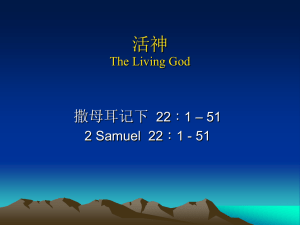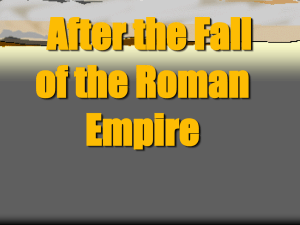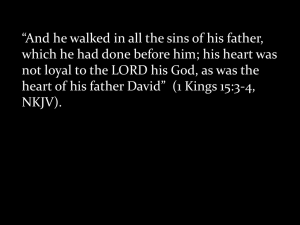PowerPoint - Mennonite Church Canada
advertisement
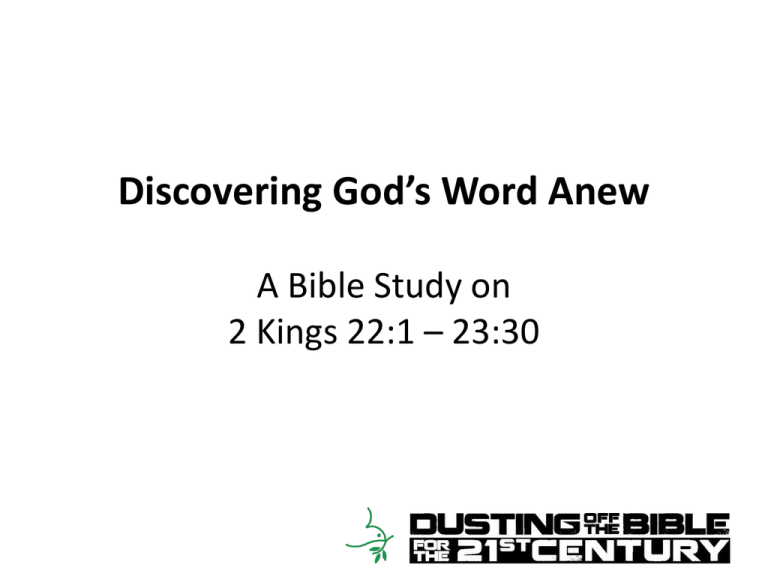
Discovering God’s Word Anew A Bible Study on 2 Kings 22:1 – 23:30 Deuteronomistic History Joshua 2 Kings • Entrance into Canaan • Covenant making • Land given • Exile in Babylon • Covenant breaking • Land taken away history with a theological agenda written during exile in Babylon: How did we lose God’s gift of the land? governed by perspective of Deuteronomy Josiah • king of Judah 640 – 609 BCE 622 BCE: 18th year of Josiah’s reign 722 BCE: Assyria destroys northern kingdom of Israel 587 BCE: Babylon conquers Judah → temple destroyed, people taken into exile How well do the kings lead Israel in covenant-keeping? Only Hezekiah and Josiah get good grades! Manasseh • • king of Judah for 55 years evil reputation “I am bringing upon Jerusalem and Judah such evil that the ears of everyone who hears of it will tingle. . . . I will wipe Jerusalem as one wipes a dish, wiping it and turning it upside down. . . . Manasseh shed very much innocent blood, until he had filled Jerusalem from one end to another.” (2 Kg 21:11ff) “I am the LORD your God, who brought you out of the land of Egypt, out of the house of slavery; you shall have no other gods before me. You shall not make for yourself an idol, whether in the form of anything that is in heaven above, or that is on the earth beneath, or that is in the water under the earth. You shall not bow down to them or worship them” (Deut 5:6-9a). “I am the LORD your God, who brought you out of the land of Egypt, out of the house of slavery; you shall have no other gods before me. You shall not make for yourself an idol, whether in the form of anything that is in heaven above, or that is on the earth beneath, or that is in the water under the earth. You shall not bow down to them or worship them” (Deut 5:6-9a). 2 Kings 22:1 – 23:30 A. Introduction of Josiah (22:1-2) • “He did what was right in the sight of the Lord, and walked in all the way of his father David; he did not turn aside to the right or to the left.” B. Josiah orders money from the temple treasury to be given to workers for repairs of the temple (22:3-7) C. The book of the law is found and read (22:8-13) • Hilkiah, the high priest → Shaphan, the secretary → Josiah, the king D. The prophetess Huldah is consulted (22:14-20) • Words regarding Jerusalem (vv. 16-17) • Words regarding King Josiah (vv. 18-20) E. The king gathers the nation for a renewal of the covenant (23:1-3) F. Josiah takes action against the idolatry of the nation (23:4-20) Interlude: The tomb of the “man of God” who predicted these things is not disturbed (vv. 16-18) G. Josiah leads the nation in observance of the Passover (23:21-23) H. Evaluation of Josiah and God’s verdict against Judah (23:24-27) I. The death of Josiah (23:28-30) 2 Kings 22:1 – 23:30 A. Introduction of Josiah (22:1-2) “He did what was right in the sight of the Lord, and walked in all the way of his father David; he did not turn aside to the right or to the left.” (v. 2) 2 Kings 22:1 – 23:30 B. Josiah orders money from the temple treasury to be given to workers for repairs of the temple (22:3-7) 2 Kings 22:1 – 23:30 C. The book of the law is found and read (22:8-13) Hilkiah, the high priest → Shaphan, the secretary → Josiah, the king 2 Kings 22:1 – 23:30 D. The prophetess Huldah is consulted (22:14-20) • Words regarding Jerusalem (vv. 16-17) Consequence . . . Cause • Words regarding King Josiah (vv. 18-20) Cause . . . Consequence 2 Kings 22:15-20 15She declared to them, "Thus says the LORD, the God of Israel: Tell the man who sent you to me, 16 Thus says the LORD, I will indeed bring disaster on this place and on its inhabitants – all the words of the book that the king of Judah has read. 17 Because they have abandoned me and have made offerings to other gods, so that they have provoked me to anger with all the work of their hands, therefore my wrath will be kindled against this place, and it will not be quenched. 18But as to the king of Judah, who sent you to inquire of the LORD, thus shall you say to him, Thus says the LORD, the God of Israel: Regarding the words that you have heard, 19 because your heart was penitent, and you humbled yourself before the LORD, when you heard how I spoke against this place, and against its inhabitants, that they should become a desolation and a curse, and because you have torn your clothes and wept before me, I also have heard you, says the LORD. 20 Therefore, I will gather you to your ancestors, and you shall be gathered to your grave in peace; your eyes shall not see all the disaster that I will bring on this place." 2 Kings 22:15-20 15She declared to them, "Thus says the LORD, the God of Israel: Tell the man who sent you to me, 16 Thus says the LORD, I will indeed bring disaster on this place and on its inhabitants – all the words of the book that the king of Judah has read. 17 Because they have abandoned me and have made offerings to other gods, so that they have provoked me to anger with all the work of their hands, therefore my wrath will be kindled against this place, and it will not be quenched. 18But as to the king of Judah, who sent you to inquire of the LORD, thus shall you say to him, Thus says the LORD, the God of Israel: Regarding the words that you have heard, 19 because your heart was penitent, and you humbled yourself before the LORD, when you heard how I spoke against this place, and against its inhabitants, that they should become a desolation and a curse, and because you have torn your clothes and wept before me, I also have heard you, says the LORD. 20 Therefore, I will gather you to your ancestors, and you shall be gathered to your grave in peace; your eyes shall not see all the disaster that I will bring on this place." 2 Kings 22:15-20 15She declared to them, "Thus says the LORD, the God of Israel: Tell the man who sent you to me, 16 Thus says the LORD, I will indeed bring disaster on this place and on its inhabitants – all the words of the book that the king of Judah has read. 17 Because they have abandoned me and have made offerings to other gods, so that they have provoked me to anger with all the work of their hands, therefore my wrath will be kindled against this place, and it will not be quenched. 18But as to the king of Judah, who sent you to inquire of the LORD, thus shall you say to him, Thus says the LORD, the God of Israel: Regarding the words that you have heard, 19 because your heart was penitent, and you humbled yourself before the LORD, when you heard how I spoke against this place, and against its inhabitants, that they should become a desolation and a curse, and because you have torn your clothes and wept before me, I also have heard you, says the LORD. 20 Therefore, I will gather you to your ancestors, and you shall be gathered to your grave in peace; your eyes shall not see all the disaster that I will bring on this place." D. The prophetess Huldah is consulted (22:14-20) [ Words regarding Jerusalem (vv. 16-17) ] 15She declared to them, “Thus says the LORD, the God of Israel: Tell the man who sent you to me, 16 Thus says the LORD, I will indeed bring disaster on this place and on its inhabitants What – all the words of the book that the king of Judah has read. 17 Because they have abandoned me and have made offerings to other gods, so that they have provoked me to anger with all the work of their hands, Why therefore my wrath will be kindled against this place, and it will not be quenched. D. The prophetess Huldah is consulted (22:14-20) [Words regarding King Josiah (vv. 18-20)] 18 But as to the king of Judah, who sent you to inquire of the LORD, thus shall you say to him Thus says the LORD, the God of Israel: Regarding the words that you have heard, 19 Why because your heart was penitent, and you humbled yourself before the LORD, when you heard how I spoke against this place, and against its inhabitants, that they should become a desolation and a curse, and because you have torn your clothes and wept before me, What I also have heard you, says the LORD. Therefore, I will gather you to your ancestors, and you shall be gathered to your grave in peace; your eyes shall not see all the disaster that I will bring on this place." 20 Josiah’s Reform Initiatives 1. Covenant renewal ceremony for nation 2. Purging of Canaanite worship 3. Passover celebration 2 Kings 22:1 – 23:30 E. The king gathers the nation for a renewal of the covenant (23:1-3) 2 Kings 23:1-3 1 Then the king directed that all the elders of Judah and Jerusalem should be gathered to him. 2 The king went up to the house of the LORD, and with him went all the people of Judah, all the inhabitants of Jerusalem, the priests, the prophets, and all the people, both small and great; he read in their hearing all the words of the book of the covenant that had been found in the house of the LORD. 3 The king stood by the pillar and made a covenant before the LORD, to follow the LORD, keeping his commandments, his decrees, and his statutes, with all his heart and all his soul, to perform the words of this covenant that were written in this book. All the people joined in the covenant. 2 Kings 22:1 – 23:30 F. Josiah takes action against the idolatry of the nation (23:4-20) • • • • Burned sacred vessels made for Baal and Asherah Deposed priests who made offerings to foreign gods Destroyed dwellings of male prostitutes Burned images of gods, beat remnants to dust, and threw them on graves • Tore down altars, high places, sacred poles • Desecrated worship sites with unclean bones • And on and on and on . . . . . 2 Kings 23:12-15 12 The altars on the roof of the upper chamber of Ahaz, which the kings of Judah had made, and the altars that Manasseh had made in the two courts of the house of the LORD, he pulled down from there and broke in pieces, and threw the rubble into the Wadi Kidron. 13 The king defiled the high places that were east of Jerusalem, to the south of the Mount of Destruction, which King Solomon of Israel had built for Astarte the abomination of the Sidonians, for Chemosh the abomination of Moab, and for Milcom the abomination of the Ammonites. 14 He broke the pillars in pieces, cut down the sacred poles, and covered the sites with human bones. 15 Moreover, the altar at Bethel, the high place erected by Jeroboam son of Nebat, who caused Israel to sin – he pulled down that altar along with the high place. He burned the high place, crushing it to dust; he also burned the sacred pole. 2 Kings 22:1 – 23:30 F. Josiah takes action against the idolatry of the nation (23:4-20) Interlude: The tomb of the “man of God” who predicted these things is not disturbed (vv. 16-18) 2 Kings 22:1 – 23:30 G. Josiah leads the nation in observance of the Passover (23:21-23) • a “remember who you are” event 2 Kings 22:1 – 23:30 H. Evaluation of Josiah and God’s verdict against Judah (23:24-27) • No king like Josiah, who turned to the Lord with all his heart, soul, and might • Divine wrath and judgment on Judah I. The death of Josiah (23:28-30) So What? 1. Disaster falls on nation despite an individual’s repentance; sin has consequences 2. Josiah is faithful despite no guarantee of outcome • The future is not set in stone; God may relent • Obedience and righteousness does not depend on reward 3. The temptation to idolatry is subtle and seductive So What? 4. The people of God have a corporate identity, shaped by Scripture, rituals, and covenants. 5. God’s word makes a compelling claim on God’s people. Being attentive to the claims of Scripture requires: a. Openness and receptivity b. Interpretation and discernment in community c. A lived response, both personal and corporate


